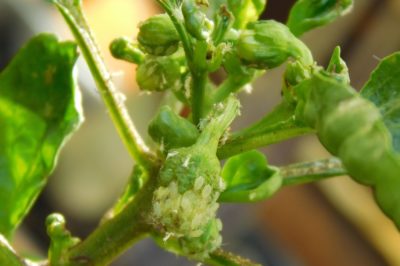Reducing Aphid Damage
Aphids are a natural part of the ecosystem and eradication isn’t necessary. For the most part, the damage they do will not kill your plant, and they tend to attack already weakened plants. Instead, focus on the realistic goal of reducing the damage they cause on plants. There are several ways:
- Water
- Predators
- Homemade Insecticide
Water
Use water to blast the insects off of the underside of the leaves. A spray nozzle on a garden hose works best. Use this technique in severe cases. The aphids will not come back to the leaves, but it is not a long-term solution. It will give you enough time to implement some other strategies.
Predators
Aphids have many predatory insects, and encouraging them to come into the garden is the best way to control aphids on a long-term basis. When in a pinch, you can order some of these insects through the mail and have them ready to work in a couple of days. Here are some aphid predators that are commercially available:
- Ladybugs: Spotted beetle that eats aphids, mealy bugs, mites and scale insects.
- Lacewings: Flying insect that eats aphids, mealybugs, mites, caterpillars, thrips and whiteflies.
- Pirate Bugs: Beetle that eats aphids, mealybugs, mites, scale insects and thrips.
- Parasitic Wasps: Specifically seek aphids for egg laying.
Homemade Insecticide
Some gardeners will make a mixture of unpleasant ingredients that is meant to both kill and deter aphids from feeding on your plants. Many of these mixtures contain cayenne pepper. Keep in mind the capsicum that makes a pepper spicy isn’t in the leaves of the plant, only the fruit.
Homemade insecticide includes one garlic bulb, one small onion, and a few teaspoons of dried cayenne pepper powder. Mince the garlic and onion and mix them with the cayenne in a spray bottle full of water. You can strain the mixture through a cheesecloth after soaking overnight if you prefer.
Spray this mixture on the undersides of all your pepper plants leaves. Not only to aphids hate onion and garlic, but the cayenne may help to also deter them from ever returning.
Long-Term Solutions
Ideally, aphid populations will swell and decline throughout the year without doing much damage to your plants. Maintain habitat for your predatory insects and plant aromatic herbs which repel pests. The healthier the plants are the less vulnerable they are to damage.
